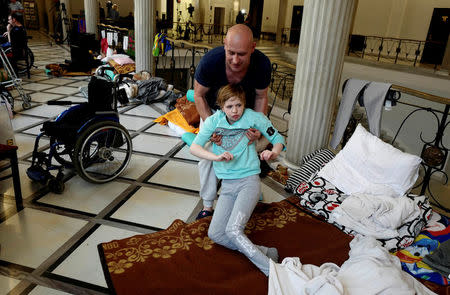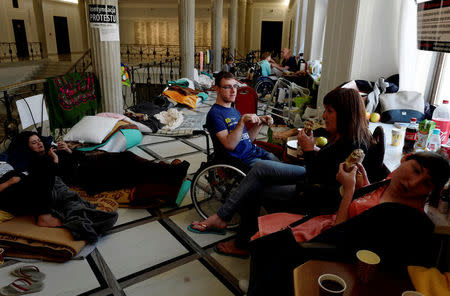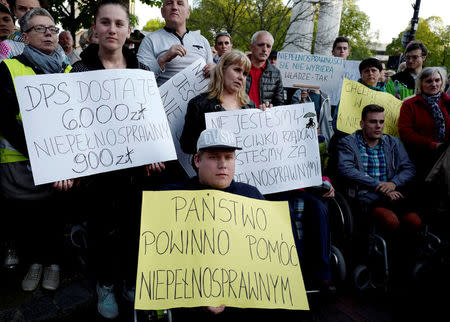Poland's populists face pre-election pressure for more social spending
By Gabriela Baczynska and Pawel Sobczak
WARSAW (Reuters) - Poland's largest union is threatening strikes this autumn unless public employees get a hefty salary hike, piling pressure on a populist government to expand already lavish social spending despite economic warning signs across Europe.
The Law and Justice Party (PiS) romped to election in 2015 and has made good on promises to champion conservative, traditional values and boost support for less-privileged Poles.
But the NSZZ Solidarnosc union, a bedrock supporter of the PiS in past elections with nearly 700,000 members, is calling for another big spend - a 12 percent pay rise to make up for inflation since public sector wages were last indexed in 2010.
Solidarnosc's demand comes as Poland enters an intense political season starting with regional elections this autumn followed by a European Parliament vote next May and a national election in late 2019.
"The economy is going well, Poland is growing, GDP growing. Poles want to feel this GDP growth in their pockets," union chief Piotr Duda told Reuters in an interview this week.
"We cannot wait with this any longer. Going out in the streets is an extreme solution but if we have no other choice, we will be out in the streets."
The government had no immediate comment.
Since coming to power, PiS has introduced cash stipends for families, raised salaries for young teachers, policemen and doctors, increased the minimum wage and lowered the retirement age in the country of 38 million.
Robust economic growth estimated at some 4.6 percent this year, plus growing employment, workforce productivity and tax collection, as well as a falling jobless rate, have shielded the budget from problems so far despite the higher social transfers.
Inflation remains low in spite of a surge in corporate sector wages in the European Union's biggest formerly communist country, whose economy is worth some $470 billion.
INCREASING FISCAL CAUTION
But economists warn that Poland may begin to suffer from weaker economic sentiment prevailing across Europe, wage pressures and labour shortages in the coming years.
They say Poland should have used the current favourable conditions to narrow its general government deficit and public debt much more than to the estimated levels of 1.5 percent of GDP and around 50 percent of GDP, respectively, this year.
The PiS has become more selective in offering money.
A case in point was a long protest by parents and their disabled children in May and June demanding more subsidies.
Repeated footage of ailing young adults sleeping on the floors of parliament dented the PiS's image. All the same, the government ruled out a new monthly handout of some $140 to the struggling families.
"There simply is no money for that in the budget," Jacek Sasin, a senior aide to the prime minister said at the time.
By contrast, a protest in Warsaw last week by farmers - a much larger, politically more influential group - won a swift government decision to grant 800 million zlotys ($217.61 million) in emergency aid to cover drought-inflicted losses.
In three years in power, the PiS government will have spent more than 67 billion zlotys ($18.3 billion) on cash handouts for families raising children, its flagship social programme.
Reversing a rise in the retirement age will cost the budget around 10 billion zlotys annually. Prime Minister Mateusz Morawiecki's other pledges, including new back-to-school subsidies, are estimated at 2.5 billion zlotys per year.
Despite multiple feuds with the EU over accusations that the PiS is undermining democracy in Poland through laws to increase political control over the judiciary and media, generous social spending ensures continued broad public support for the PiS.
It is currently expected to win re-election next year - again on slogans of national pride and a loose fiscal line.
But even a member of the Polish central bank's rate-setting panel who shares many of the PiS's economic views, Kamil Zubelewicz, warned of consequences.
"Pressure for more public spending is growing, driven by the rhetoric of a very good economic and budgetary situation," he told Reuters. "The closer we get to local elections, the more social demands we will get."
($1 = 3.6763 zlotys)
(Writing by Gabriela Baczynska; Editing by Mark Heinrich)




